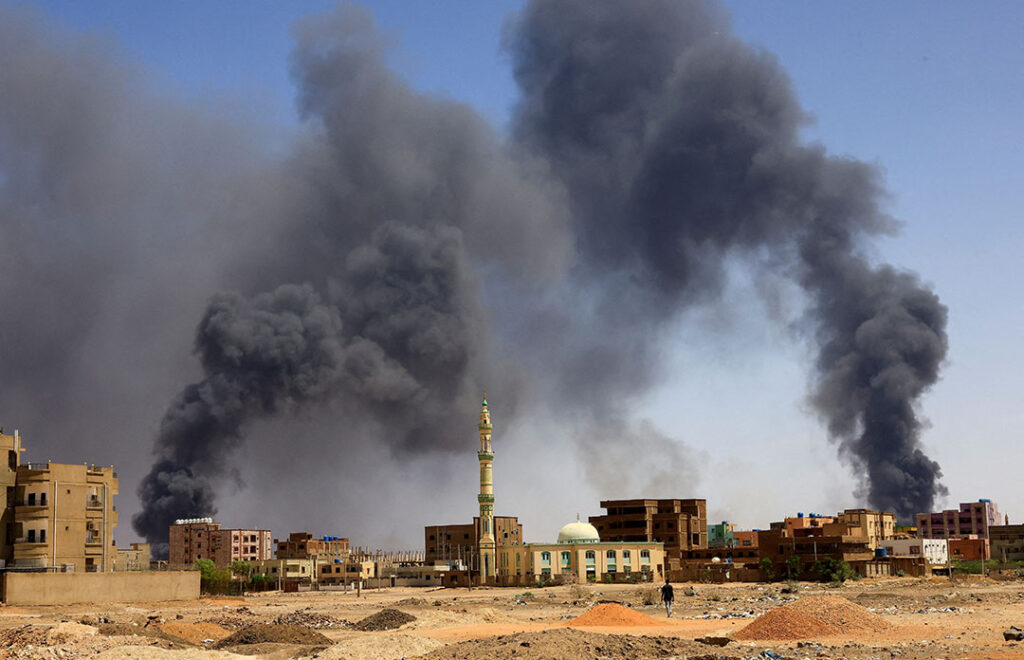ADF STAFF
Battles between Sudan’s rival military leaders spread from Khartoum, the nation’s capital, to Darfur in late April, sparking concerns that a decades-old conflict in the western desert region may be reignited.
Darfur attracted worldwide attention around 2003, when a rebel group took on the Sudanese government, alleging that it discriminated against non-Arabs.
Led by then-President Omar al-Bashir, the government responded by supporting a group of militias known as the Janjaweed, which looted and burned villages, polluted water sources, and murdered, tortured and raped civilians. The conflict in Darfur claimed more than 300,000 lives.
Residents around Darfur recently reported clashes between the Sudanese Armed Forces (SAF), led Gen. Abdel Fattah al-Burhan, Sudan’s de facto ruler, and the Rapid Support Forces (RSF) led by Gen. Mohamed Hamdan Dagalo, known as Hemedti.
Al-Burhan and Hemedti each have ties to Darfur. Al-Burhan rose through the military ranks as a soldier in the region while Hemedti led a militia that did much of the government’s fighting during the Darfur war.
“Whichever way the current battle for Khartoum goes, we expect a bloodier conflict now in the Darfur region — more armed groups, more weapons, deeper enmities,” Will Carter, head of the Norwegian Refugee Council in Sudan, told Reuters.
The situation also troubled Toby Harward, principal situation coordinator for the United Nations High Commissioner for Refugees (UNHCR) in Darfur, where 1.5 million people live in refugee camps.
“[The UNCHR] is extremely concerned that if the fighting isn’t brought to an immediate end, it could unleash communal conflicts that will have an absolutely devastating effect on the very fragile social fabric of Darfur and risk repeating previous conflicts,” Harward told The Guardian.
Fighting between the SAF and RSF erupted in the West Darfur town of El Geneina on April 24. Witnesses said that fighters from two other rebel groups soon joined the fray. During that day’s violence, fighters killed more than 70 people, attacked and looted the El Geneina Teaching Hospital — the main referral hospital in the area — and destroyed homes and schools.
“There was smoke and fire everywhere,” a 39-year-old resident who fled the town told Human Rights Watch.
Some observers fear that the violence in Darfur may also attract fighters and weapons from the Central African Republic (CAR), Chad and Libya.
Hemedti’s cousin, Bichara Issa Djadallah, is an advisor to Chadian President Mahmat Idriss Deby and head of the Chad-Sudan joint task force that monitors the Darfur border.
Chadian residents told Al Jazeera that the SAF and RSF are pushing non-Arabs and Arabs to align with them, respectively.
“In the coming days, depending on how the situation evolves, we could have more people in Chad positioning themselves in one camp or in the other [in Darfur] regardless of the position of the [Chadian] state,” Remadji Hoinathy, an expert on Chad for the Institute for Security Studies, told Al Jazeera in early May.
Libyan commander Gen. Khalifa Haftar also has interests that align with the RSF, according to Jalel Harchaoui, an expert with the Clingendael Institute, a Dutch think tank.
Groups with direct links to Haftar’s family have gained control over lucrative drug, vehicle and human smuggling routes in the Libyan city of Kufra, which borders Darfur, making the RSF one of the Libyan National Army’s main trade partners. That could persuade Haftar to back Hemedti, Harchaoui told Al Jazeera.
“If you are a bad guy and do business for years and years with another bad guy, then you will want that bad guy to survive because you want your business to survive,” Harchaoui said.
While the CAR has maintained neutrality throughout the Sudan crisis, several armed groups in the country have accumulated weapons and recruits from Darfur in the past, according to John Lechner, an expert on the Russia’s Wagner Group of mercenaries and rebel groups in the Sahel.
“I think [CAR] armed groups will largely stay out of the actual fight [between RSF and SAF]. But if some of the [Darfur] communities that these armed groups in CAR recruit from become involved in the conflict, then we could see people going back to fight — not necessarily in the name of the armed groups — but on an individual basis,” Lechner told Al Jazeera.

